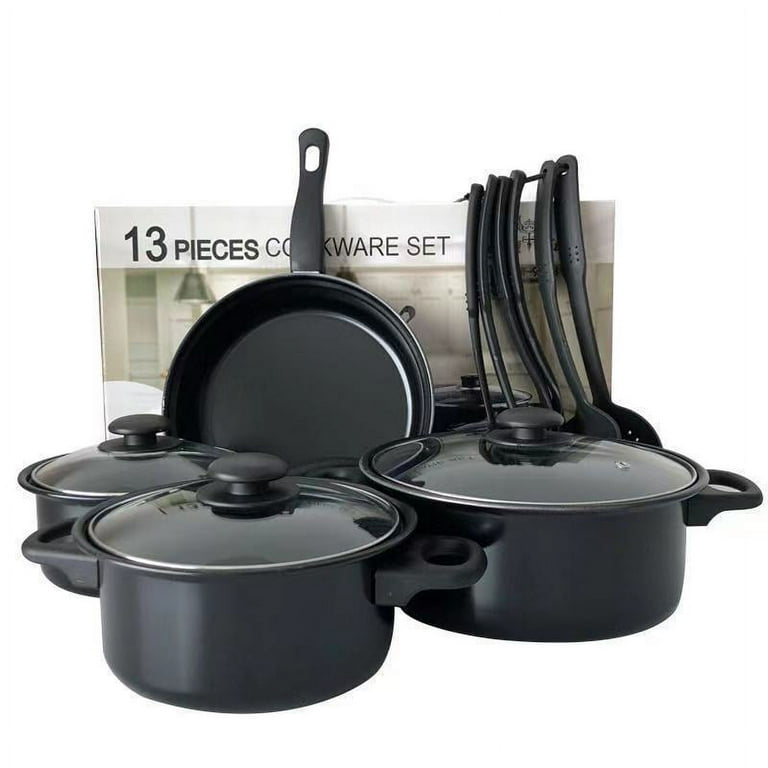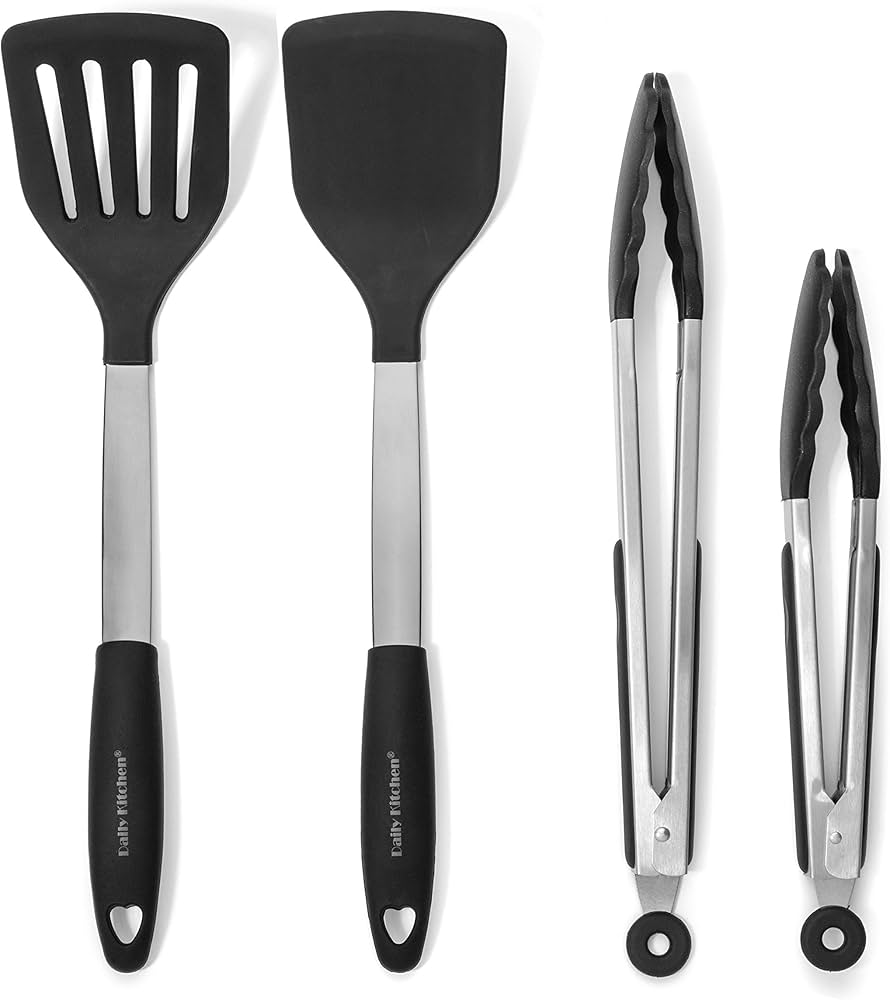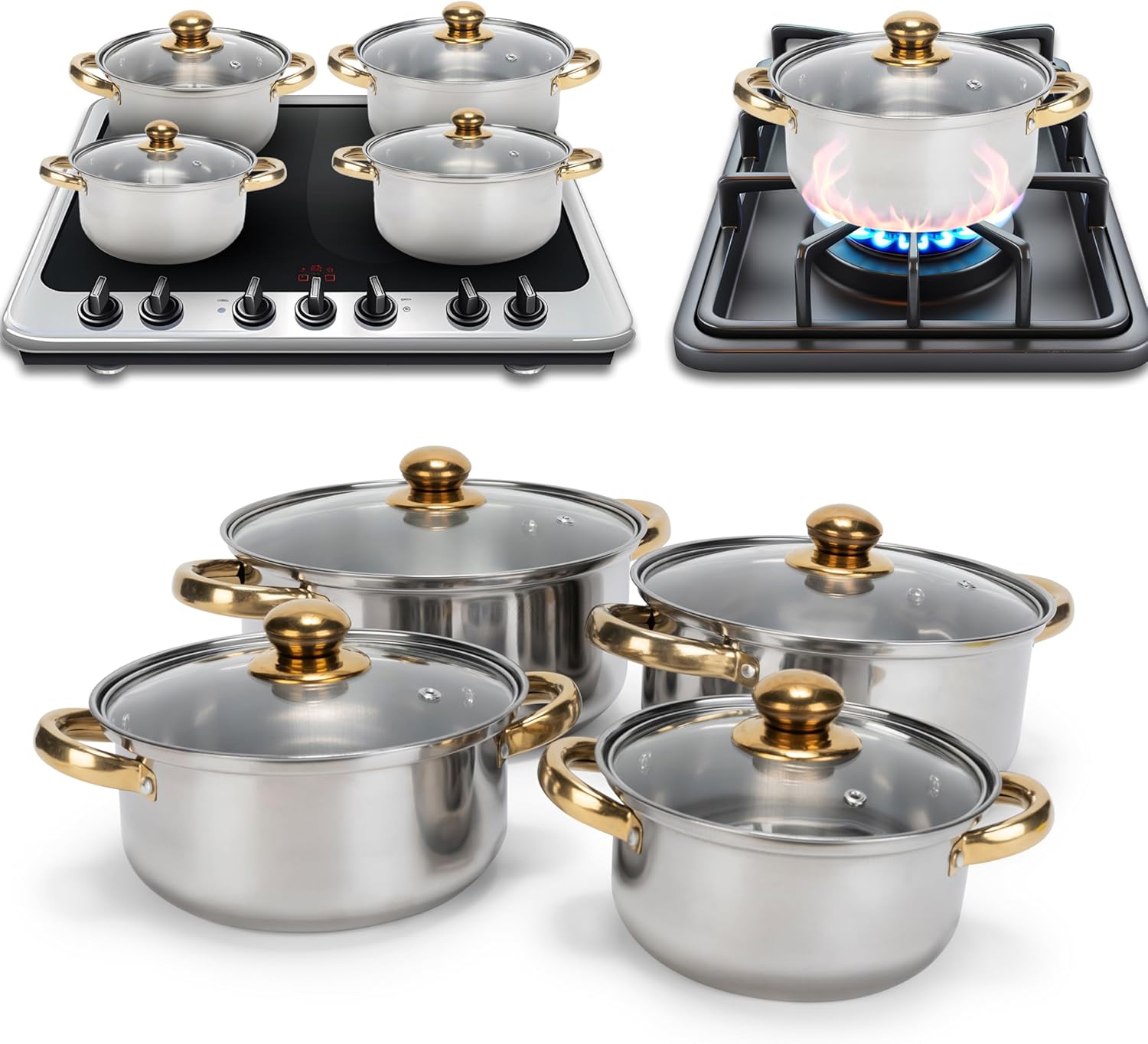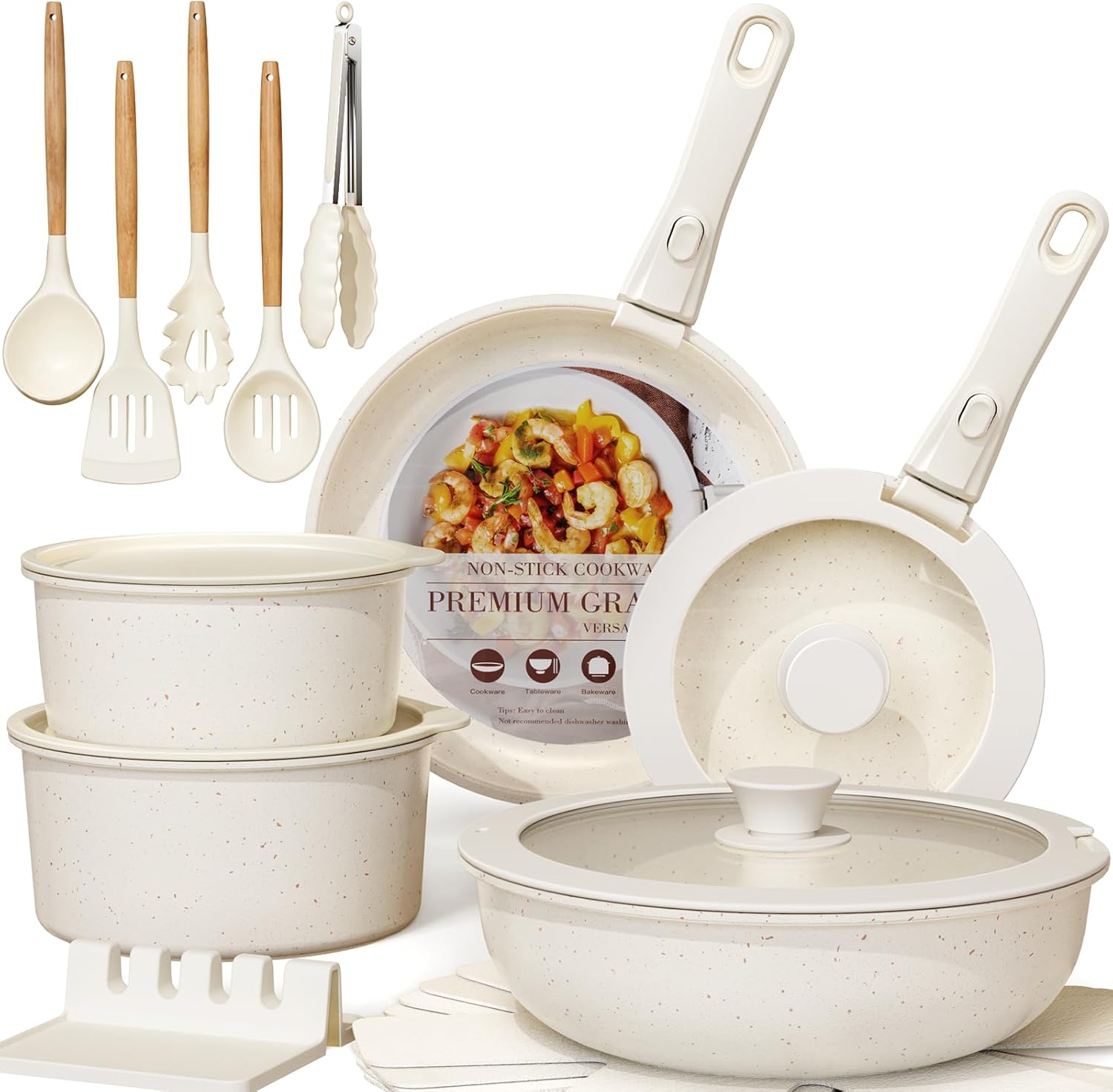Durable non-stick cookware is designed for everyday cooking and offers easy food release and effortless cleaning. Its sturdy construction ensures long-lasting performance and versatility in the kitchen.
Durable Non-Stick Cookware for Daily Use:Choosing durable non-stick cookware for daily use can transform your cooking experience. This type of cookware provides excellent heat distribution, ensuring even cooking. It minimizes the need for excessive oils or fats, promoting healthier meals. With a variety of options available, including frying pans, saucepans, and bakeware, you can find the perfect pieces to suit your culinary needs.
Many brands incorporate advanced coatings that resist scratches and wear, making them ideal for regular use. Investing in high-quality non-stick cookware saves time and effort, allowing you to focus more on enjoying your meals and less on cleanup.
The Quest For The Perfect Non-stick Cookware
Finding the right non-stick cookware can feel overwhelming. Many options claim to be the best. Choosing the right one impacts cooking and cleanup. The perfect non-stick cookware makes daily cooking easier.
Key Features To Look For
- Durability: Look for coatings that resist scratches.
- Heat Resistance: Cookware should handle high temperatures well.
- Ease of Cleaning: Non-stick surfaces should wipe clean easily.
- Even Heat Distribution: Cookware should cook food evenly.
- Compatibility: Check if it works on induction cooktops.
Materials That Last
Choosing the right materials is crucial for long-lasting cookware. Here are some common materials:
| Material | Durability | Heat Resistance |
|---|---|---|
| Teflon | Good | Low to Medium |
| Ceramic | Very Good | High |
| Hard-Anodized Aluminum | Excellent | High |
| Stainless Steel with Non-Stick Coating | Excellent | High |
Each material offers unique benefits. Choose based on your cooking style. Quality materials ensure a longer lifespan. Invest wisely for daily cooking needs.
:max_bytes(150000):strip_icc()/faw-primary-nonstick-cookware-wdickey-1093-1-758b71681dc549349983b582a0a4b5eb.jpeg)
Credit: www.foodandwine.com
Ceramic Vs. Teflon Coatings
Choosing between ceramic and Teflon coatings can be tough. Each type offers unique benefits. Knowing their pros and cons helps in making the right choice.
Pros And Cons Of Ceramic
Ceramic cookware has gained popularity. It is often praised for its safety and performance. Here are the main pros and cons:
| Pros | Cons |
|---|---|
|
|
Understanding Teflon’s Durability
Teflon is known for its smooth surface. It offers great non-stick properties. Here’s what to know about its durability:
- Long-lasting non-stick surface: Stays effective for many uses.
- Easy to clean: Food does not stick.
- Lower heat tolerance: Can warp at high temperatures.
- Potential health concerns: Some worry about chemicals.
Choose Teflon for quick cooking. Opt for ceramic for healthier meals. Both have unique features. Your cooking style will guide your choice.
Cast Iron Skillets: A Timeless Choice
Cast iron skillets are a classic kitchen tool. They offer excellent heat retention. This makes them perfect for frying, baking, and searing. Their durability sets them apart from other cookware. With proper care, they last a lifetime.
Seasoning Your Skillet
Seasoning is vital for cast iron skillets. It creates a non-stick surface. Here’s how to season your skillet:
- Clean the skillet thoroughly.
- Apply a thin layer of vegetable oil.
- Place it upside down in the oven.
- Bake at 350°F (175°C) for one hour.
- Let it cool before using.
Repeat this process regularly to maintain the non-stick surface.
Maintenance Tips
Proper maintenance keeps your skillet in great shape. Follow these tips:
- Wash with hot water and a soft sponge.
- Avoid soap or harsh detergents.
- Dry completely to prevent rust.
- Reapply oil after each wash.
Store your skillet in a dry place. This prevents moisture and rust. Regular seasoning and care will ensure your skillet lasts for generations.
Stainless Steel: The Professional’s Choice
Stainless steel cookware is a staple in many professional kitchens. Its sleek design and functionality attract chefs and home cooks alike. Durable, non-stick stainless steel offers a perfect blend of performance and longevity. This cookware makes daily cooking enjoyable and efficient.
Why Stainless Steel Stands Out
Stainless steel has unique qualities that enhance cooking experiences. Here are some key benefits:
- Durability: Stainless steel resists scratches, dents, and rust.
- Heat Distribution: It heats evenly, preventing hot spots.
- Versatility: Suitable for stovetops, ovens, and broilers.
- Low Maintenance: Easy to clean and dishwasher safe.
- Non-Reactive: It does not react with acidic foods.
Combining Durability With Non-stick
Modern stainless steel cookware often features a non-stick coating. This combination provides several advantages:
| Feature | Benefit |
|---|---|
| Easy Release: | Food slides off easily, reducing mess. |
| Healthier Cooking: | Less oil needed for cooking. |
| Quick Cleanup: | Less scrubbing required after meals. |
Choosing durable, non-stick stainless steel cookware enhances daily cooking. It combines efficiency with professional quality. Elevate your culinary skills with this essential kitchen tool.
Anodized Aluminum Cookware
Anodized aluminum cookware is a popular choice for daily cooking. It combines durability and non-stick properties. This cookware is ideal for both amateur and professional chefs. Let’s explore its benefits and care tips.
Benefits Of Anodized Surfaces
Anodized surfaces offer several advantages:
- Durability: Anodized cookware lasts longer than regular aluminum.
- Non-Stick: Food releases easily, making cooking and cleaning simple.
- Heat Distribution: Heats evenly, preventing hot spots.
- Corrosion Resistance: Protects against scratches and wear.
- Safe Cooking: Free from harmful chemicals like PFOA.
Caring For Anodized Cookware
Proper care extends the life of anodized cookware. Follow these tips:
- Hand Wash: Use warm, soapy water and a soft sponge.
- Avoid Abrasives: Do not use steel wool or scouring pads.
- Dry Immediately: Prevent water spots and maintain appearance.
- Use Low to Medium Heat: High heat can damage the surface.
- Store Carefully: Avoid stacking to prevent scratches.
With these tips, enjoy cooking with anodized aluminum cookware. It makes daily meals easier and more enjoyable.
Cookware Sets Vs. Individual Pieces
Choosing between cookware sets and individual pieces can be tricky. Each option has its benefits. Understanding these can help you make the best choice for your kitchen.
Building Your Collection
Starting your cookware collection can be exciting. Here are some tips:
- Assess Your Needs: Consider what you cook most.
- Choose Versatile Pieces: Items like frying pans and saucepans work for many recipes.
- Mix and Match: Combine individual pieces for a unique collection.
Cookware sets offer convenience. They often include essential pieces. This can simplify your shopping experience.
Individual pieces allow for flexibility. You can buy only what you need. This approach suits specific cooking styles.
Cost-effectiveness Analysis
Cost is a major factor in choosing cookware. Here’s a breakdown of costs:
| Option | Average Cost | Benefits |
|---|---|---|
| Cookware Sets | $100 – $300 | Complete collection, discounts on multiple items |
| Individual Pieces | $20 – $100 each | Buy only what you need, customize your collection |
Cookware sets can save money over time. They often include discounts on several items. Individual pieces may cost more overall.
Calculate your budget carefully. Consider how often you cook. This analysis will help you decide.
Top Brands For Long-lasting Cookware
Choosing the right cookware is essential for every kitchen. Durable non-stick cookware enhances cooking experiences. Certain brands stand out for their quality and reliability. Here are some top brands that offer long-lasting cookware.
Brand Reputation And Reliability
Brand reputation plays a significant role in choosing cookware. Reliable brands ensure safety and durability. Here are some top brands known for their non-stick cookware:
| Brand | Key Features |
|---|---|
| Calphalon | Hard-anodized aluminum, even heat distribution |
| Tefal | Thermo-spot technology, scratch-resistant surface |
| GreenPan | Eco-friendly ceramic coating, non-toxic materials |
| All-Clad | Stainless steel and aluminum, lifetime warranty |
Warranty And Customer Service
A strong warranty reflects a brand’s confidence in its products. Good customer service enhances the buying experience. Consider the following brands for their excellent warranties:
- Calphalon: Limited lifetime warranty. Responsive customer service.
- Tefal: 2-3 years warranty. Quick replacement process.
- GreenPan: Limited lifetime warranty. Friendly support team.
- All-Clad: Lifetime warranty. Reliable customer assistance.
Choose brands with strong reputations and warranties. This ensures you invest in high-quality, durable cookware.
User Reviews And Recommendations
Durable non-stick cookware is popular among home chefs. Users love its ease of use and cleaning. Many reviews highlight its excellent heat distribution. This section explores real-life experiences and the best cookware for different styles.
Real-life Experiences
Many users share their stories about non-stick cookware. Here are some common themes:
- Easy Cleanup: Most users enjoy quick cleaning. Just a simple wipe and it’s done.
- Food Release: Users report that food slides off easily. No more sticking or scraping.
- Durability: Many products withstand daily use. They resist scratches and chips well.
Here are some direct quotes from users:
“I can’t believe how easy it is to cook eggs!”
“Cleaning up after dinner feels like a breeze.”
“I’ve had my set for years, and it still looks new.”
Best Picks For Various Cooking Styles
Choosing the right cookware matters for different cooking styles. Here are some top recommendations:
| Cooking Style | Recommended Cookware | Key Features |
|---|---|---|
| Frying | Skillet Set | Even heat, scratch-resistant surface |
| Sautéing | Sauté Pan | High sides, durable coating |
| Baking | Baking Sheets | Non-stick finish, easy release |
| Boiling | Stock Pot | Heavy-duty, even heating |
Consider these factors:
- Material Quality: Look for heavy-gauge options.
- Handle Comfort: Ensure handles are heat-resistant.
- Compatibility: Check if it works on your stovetop.
These user reviews and recommendations can guide your purchase. Durable non-stick cookware can enhance your cooking experience.
Proper Use And Maintenance
Durable non-stick cookware can make cooking easier and more enjoyable. Proper use and maintenance will enhance their lifespan. This section covers essential tips to keep your cookware in top shape.
Maximizing Lifespan
To maximize the lifespan of your non-stick cookware, follow these simple practices:
- Use low to medium heat: High temperatures can damage the coating.
- Choose the right utensils: Use silicone or wooden utensils to prevent scratches.
- Clean properly: Hand wash with a soft sponge and mild detergent.
- Avoid abrasive cleaners: They can wear down the non-stick surface.
- Store carefully: Stack cookware with cloth or paper towels in between.
Common Mistakes To Avoid
Avoid these common mistakes to protect your cookware:
- Cooking on high heat: This can ruin the non-stick layer.
- Using metal utensils: They scratch and damage the coating.
- Putting in the dishwasher: Hand washing is safer for the coating.
- Ignoring scratches: Small scratches can lead to bigger issues.
- Storing without protection: Always use cloth between stacked pans.
By following these tips, you can keep your durable non-stick cookware in excellent condition. Enjoy cooking with ease and efficiency!

Credit: www.amazon.com
Innovations In Non-stick Technology
Non-stick cookware has come a long way. Recent innovations have improved performance, safety, and durability. Modern non-stick surfaces make cooking easier and healthier. Here’s a look at the latest advancements and future trends.
Recent Advancements
New non-stick technologies focus on enhancing user experience. Key advancements include:
- Scratch-Resistant Surfaces: New coatings resist scratches better.
- Healthier Materials: Many brands use PFOA-free materials.
- Heat Distribution: Improved designs ensure even heat distribution.
- Eco-Friendly Options: Some companies use sustainable manufacturing processes.
These advancements result in cookware that lasts longer. Users enjoy better cooking results and easier cleaning.
What The Future Holds
The future of non-stick cookware looks promising. Innovations in materials and technology will enhance performance. Potential trends include:
- Smart Cookware: Integration of technology for better cooking control.
- Advanced Coatings: More durable and versatile non-stick surfaces.
- Recyclable Materials: Focus on sustainability and eco-friendliness.
- Customizable Cookware: Options for personalizing cookware to user needs.
These trends will shape the way we cook. Expect more efficient and user-friendly products.

Credit: www.walmart.com
Frequently Asked Questions
What Are The Benefits Of Non-stick Cookware?
Non-stick cookware offers several advantages. It requires less oil, making meals healthier. Food releases easily, reducing cooking time and cleanup. Additionally, non-stick surfaces prevent food from burning. This cookware is perfect for everyday use, ensuring delicious results without hassle.
How To Maintain Non-stick Cookware Properly?
To maintain non-stick cookware, avoid metal utensils to prevent scratches. Use soft sponges for cleaning, and never use abrasive cleaners. Hand washing is preferred over dishwashers. Store pans carefully to avoid stacking them directly. Following these tips will extend the lifespan of your cookware significantly.
Is Non-stick Cookware Safe For Health?
Yes, high-quality non-stick cookware is safe when used correctly. Look for products free from harmful chemicals like PFOA. Avoid overheating pans, as excessive heat can degrade the coating. Following manufacturer guidelines ensures safe and effective cooking. Always prioritize quality when selecting non-stick options.
Can Non-stick Cookware Go In The Oven?
Many non-stick cookware pieces are oven-safe, but check the manufacturer’s guidelines. Generally, cookware with metal handles is oven-safe, while those with plastic handles may not be. Keep temperature limits in mind to avoid damaging the coating. Always verify specifics for each piece to ensure safe use.
Conclusion
Choosing durable non-stick cookware enhances your cooking experience. It offers convenience, easy cleanup, and excellent heat distribution. Investing in quality pieces ensures they withstand daily use. With the right cookware, you can enjoy healthier meals without the hassle. Upgrade your kitchen essentials for better cooking today!





Leave a Reply